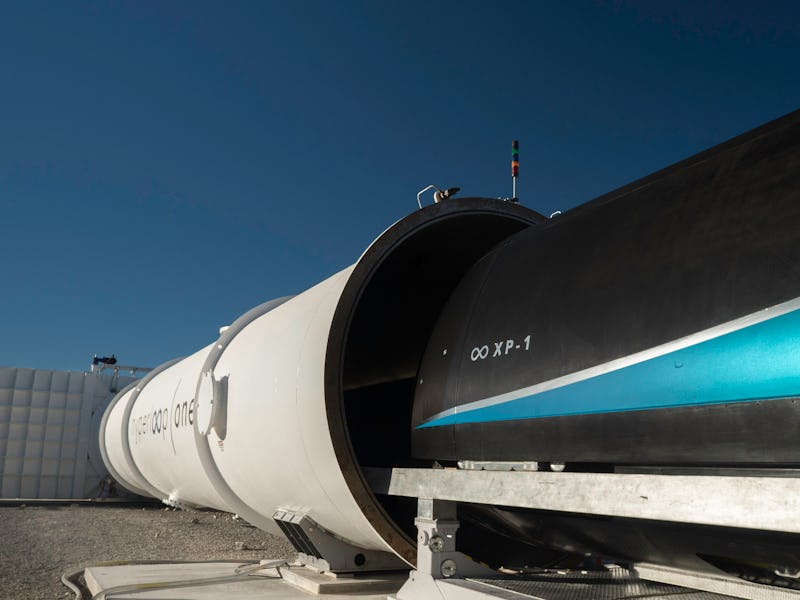On Monday, Virgin Hyperloop One announced it has raised $50 million in Series C funding for its futuristic tube transportation technology, pairing the news with footage of its test pod — dubbed XP-1 — traveling through a vacuum tube at 240 mph.
The new high speed was part of a testing round that finished on Friday, December 15. The tests were conducted in a tube “depressurized down to the equivalent air pressure experienced at 200,000 feet above sea level.” At that low pressure, electricity-powered magnetic levitation lifts the pod above the track, and it glides at a high speed for long distances because there’s scant resistance. If you’ve ever felt the whoosh of air that’s being pushed by a subway train while standing on the platform, imagine if that whoosh wasn’t there, because it had been sucked out by a vacuum. Without that air resistance, a vessel can travel much faster and use far less energy.
“All components of the system were successfully tested including the airlock, highly efficient electric motor, advanced controls and power electronics, custom magnetic levitation and guidance, pod suspension, and the vacuum,” the company announced.
Here’s the video released on Monday:
In October, Richard Branson announced that his Virgin Group had invested in Hyperloop One, the LA-based company bringing Elon Musk’s transport system to life. The deal also saw it renamed to Virgin Hyperloop One.
The news came after the company revealed in August a video of its 28.5-foot-long XP-1 pod traveling 192 mph inside a 1,500-foot tube called “dev loop.”
Here’s the video of that August test:
$50 Million in Funding
Branson’s latest venture is pitching itself firstly as a service that will rethink how people view shipping because of the incredible speeds at which the large pods will travel. If the transportation system can achieve half of the 700 mph prediction in Musk’s now-famous white paper (“Hyperloop Alpha,” published in August 2013), shipping goods across the country over land could take hours, not days. Hyperloops could slice through congested coastal cities near major ports, moving tons of good inland faster, while decongesting freeways. In fact, Virgin Hyperloop One was eyeing a transportation tube that would travel to and from the Port of Los Angeles.
“It’s Amazon Prime on steroids,” Nick Earle, a Virgin Hyperloop One executive, told Inverse earlier this year. “You don’t have to use a fleet of airplanes. You don’t have to use warehouses outside of cities to store goods because you have to truck them in to meet that one-hour deadline that’s in the contract for Amazon Prime.”
People Will Travel in Hyperloop Pods, Too
Musk, whose Boring Company is unaffiliated with Virgin Hyperloop One, and should probably be considered a competitor, is also working transport tube, albeit one that goes underground:
(Virgin Hyperloop One CEO Rob Lloyd says his hyperloop will go underground, too.)
While Musk has perhaps smartly spent much of his time talking about the Boring Company as a human transportation solution — people are more interested in traffic jam relief than shipping container movement — Virgin Hyperloop One has made its own overtures to solving traffic jams, with its various “global challenges,” which were proposal presentations held on three continents including the “Vision for America” held in D.C. this spring. A proposed hyperloop route that cuts through Colorado would be studied by the company, it announced in September.
Branson, Musk’s predecessor when it comes to the executive-as-a-brand, was also announced as Virgin Hyperloop One’s new chairman on Monday. In a statement, he offered a clear direction for where Virgin Hyperloop One is headed: The new $50 million investment “sets up the company to pursue opportunities in key markets in the Middle East, Europe, and Russia as it develops game-changing and innovative passenger and cargo ground transport systems.”
Lloyd has said he wants to have five hyperloops under construction by 2021; Musk hasn’t made any predictions involving a year, involving a year, butsaid there are projects his Boring Company is pitching in Chicago and Maryland. It looks like the hyperloop race will only accelerate in 2018.
